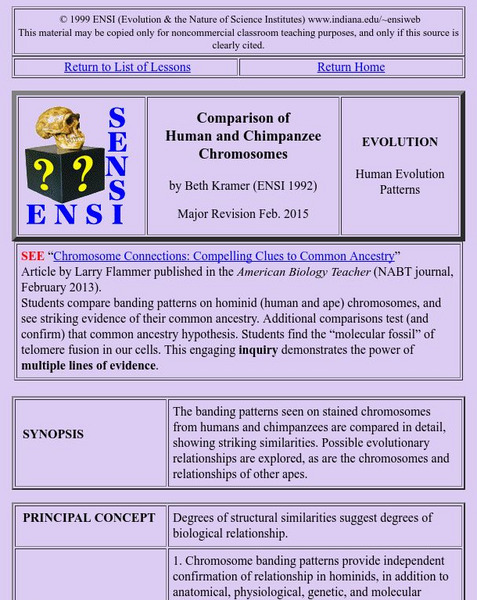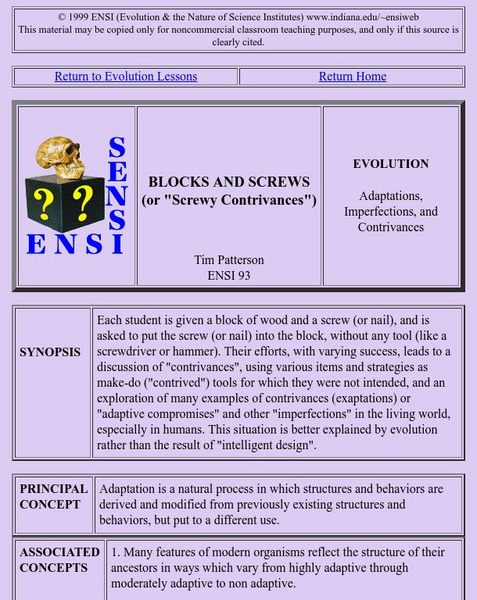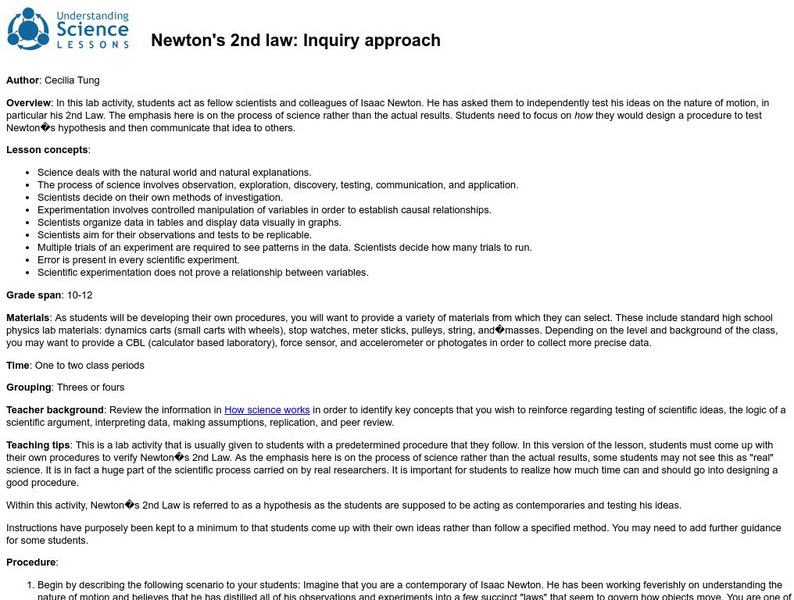Hi, what do you want to do?
Indiana University
Ensi: Comparison of Human: Chimpanzee Chromosomes Lesson
This is a great lesson plan that combines Karoytypes and evolution. Students will recognize that the chromosomes of chimpanzees and humans are remarkably similar, then correlate that to their evolutionary relationship.
University of Georgia
University of Georgia: What Science Isn't
This series of notes from a geology professor explores and explains several misconceptions about the nature of science. Sections are titled: A Historical Perspective; Science Isn't Art; Science is not Technology; Science isn't Truth and...
Indiana University
Ensi: Introduction to Evolution Lesson Plan
This unit plan presented by the Evolution and the Nature of Science Institutes is one way to introduce evolution. The authors have created a Pre-test about what evolution is/is not to address misconceptions. There are handouts and...
Open Curriculum
Open Curriculum: Early Life
The aim of this article relates the nature of science to our current understanding of the origin of life and describe the formation of the atoms which build the Earth and its life.
Indiana University
Ensi: Blocks and Screws Lesson Plan
The Evolution and the Nature of Science Institute offers lesson plans that investigate the vestigial organs in such a way as to better explain their imperfections as proof of evolution rather than the result of "intelligent design."
University of California
University of California: Understanding Science: How Science Really Works
Need a tutorial about the nature and process of science? Here is your one stop for knowledge about what science is, how it works, science and society, and why science matters. This site expands on your scientific toolbox by allowing you...
Sophia Learning
Sophia: Plant Kingdom: Two Approaches to Learn About Nature
Take one of two approaches when investigating nature, using either inductive or deductive reasoning.
Other
The Ultimate Nature of Matter
Modern science is based on the idea of matter. This essay, by Alan Bradnam of the University of Sheffield (UK), discusses the impact of this idea on the world of science.
University of California
University of California: Understanding Science: The K 2 Teachers' Lounge
A collection of teacher resources on the "how to" incorporate the nature and process of science into your curriculum. Site includes tips for the teacher, sample starting activities, teaching tools, and sample lessons.
University of California
University of California: Understanding Science: The 6 8 Teachers' Lounge
A collection of teacher resources on the "how to" incorporate the nature and process of science into your curriculum. Site includes tips for teacher, sample starting activities, teaching tools, and sample lessons.
University of California
University of California: Understanding Science: The 3 5 Teachers' Lounge
A collection of teacher resources on the "how to" incorporate the nature and process of science into your curriculum. The site includes tips for the teacher, sample starting activities, teaching tools, and sample lessons.
University of California
University of California: Understanding Science: The 9 12 Teachers' Lounge
A collection of teacher resources on the "how to" incorporate the nature and process of science into your curriculum. Site includes tips for the teacher, sample starting activities, teaching tools, and sample lessons.
Other
Elementary Science Program: Astronomy, Gr. 5 8
"Astronomy is the science that studies the Earth, the Moon and other objects in space. It has helped us discover our place in the physical universe. It is still making discoveries." This landing page gives options for students and...
Other
Ministry of Science and Innovation: Science Learning Hub
Designed to support the effective teaching of science in New Zealand Schools, this portal provides resources to support teacher professional development. Science educators can find resources for content for their own learning, in...
Climate Literacy
Clean: Time Series: Uncovering the Hidden Processes in Science
In the following exercise, students will review techniques useful to scientists asthey analyze series of data. Learn about scientific observation and try to recognize a pattern or trend within the data.
PBS
Pbs Learning Media: Nova: Gross Science: Collection
Why do we smell different when we're sick? Why does cheese smell like feet? Why don't vultures get sick from eating rotting meat? Science is filled with stories: some of them are beautiful and some of them are gross. Really gross. Gross...
University of California
University of California Museum of Paleontology: Science Checklist [Pdf]
Use this seven item checklist to make sure all the parts of a good science investigation are in place.
Sophia Learning
Sophia: What Is Science?
A brief overview of the body of science, including the purpose of doing scientific work.
CK-12 Foundation
Ck 12: Biology: Basics of Science Study Guide
This comprehensive study guide covers the key terms and basic concepts needed for an intro to science unit.
Indiana University
Ensi: The Great Fossil Find Lesson Plan
Students hear a story as they "find" bones that you have put in an envelope for them. Their job is to begin assembling the bones as best they can. The students will invariably come up with different configurations--just like scientists...
PBS
Pbs Learning Media: A Colorful Hypothesis
Use "Dinosaur Train" to illustrate and excite your students about creating a hypothesis. Website includes a video of "Dinosaur Train", a lesson plan, and student's handout. Lesson plan includes a lab where students can practice making...
Texas Education Agency
Texas Gateway: 4.8 Extended Topic: The Four Basic Forces: An Introduction
By the end of this section, you will be able to understand the four basic forces that underlie the processes in nature: gravitational, electromagnetic, weak nuclear, strong nuclear forces.
PBS
Pbs Learning Media: Microscope Activity
Explore the parts of a compound microscope and view cells through this interactive lesson.
University of California
Understanding Science: Newton's 2nd Law: Inquiry Approach Lesson
For this lesson, students develop their own scientific experiment to test Newton's hypothesis that the acceleration of an object depends on the net force acting upon it and its mass. After completing their designed experiment, students...
Other popular searches
- History and Nature of Science
- The Nature of Science
- Nature of Science Biology
- Nature of Science Inquiry
- Nature of Science Physics
- History Nature of Science
- Genetics Nature of Science
- Teaching Nature of Science
- Nature of Science Weather
- Genetic Nature of Science
- Nature of Science Experiments
- Nature of Science and Weather






















